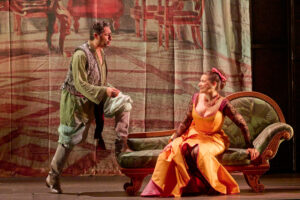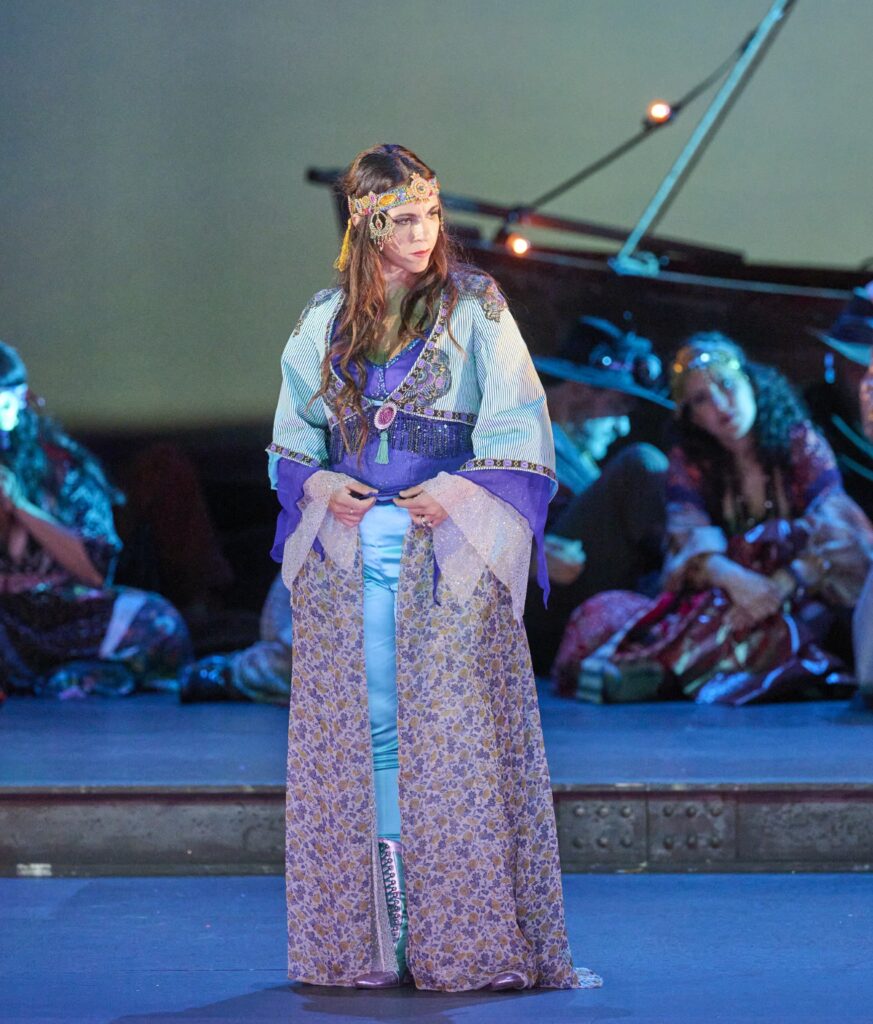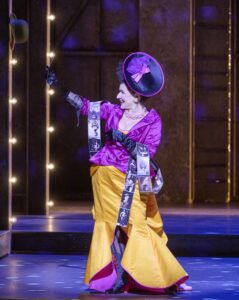Zaida (mezzo Josè Maria lo Monaco) floats across the stage (on tracks) – ‘I have lost my beloved and cannot find him.’ The favourite of Turkish Prince Selim, but the victim, slandered by a jealous harem, her life was saved by her protector Albazar (David Astorga).
Meanwhile Don Geronio (Nicola Alaimo) arrives to have his fortune told. He’s the luckless husband of the feckless Fiorilla (Cecilia Bartoli). No wonder she has multiple lovers.
Alaimo’s Geronio- pot-bellied, and holding onto his wig- sings (beautiful baritone), his wife’s mind is so devious, even an astrologer can’t tell how it works!
Fiorella is telling friends how boring it would be to be faithful to her husband : Non si dà follia maggiore No greater madness to love one man. Bartoli’s prima donna is wearing a gold skirt, ruffed purple silk top, and that hat insolently angled. With her bronze parasol, she cocks a snoot, ‘she has a fickle heart; are they trying to chain her in?’
 A Turkish ship is expected, Prince Selim’s on a trip ‘to study European customs’. A ghostly ship appears on the projected seascape. Realistic waves in Grinda and Souliers’s video. They’ll see who lands, Voga voga a terra. Wonderful chorus.
A Turkish ship is expected, Prince Selim’s on a trip ‘to study European customs’. A ghostly ship appears on the projected seascape. Realistic waves in Grinda and Souliers’s video. They’ll see who lands, Voga voga a terra. Wonderful chorus.
Beautiful Italy, I greet you, friendly shores. Ildebrando D’Arcangelo’s Selim immediately falls for Bartoli’s Fiorilla. D’Arcangelo in a raunchy silver outfit – swaggering, a little piratical- has tremendous stage presence, and his bass-baritone immense timbre. So Fiorilla wants to get close to him; and I want to have fun, she sings. It’s not that hard to compare the love of a Turk!
Over coffee (at Fiorilla’s) she asks him how many lovers have you had: how many would you like? She taunts him (with the rumour), she didn’t believe he had a hundred wives; you buy them and enjoy them. Selim remonstrates, a Turk also feels love: tells her of one (Zaida) he’d loved before. 
In the comedy, their intimacies are interrupted by the returning husband Geronio. Bartoli’s centre stage in a brilliant orange gown, prevents them. Selim, Italian men are more polite than Turkish: Geronio, sardonically, an old man can commit no greater victory than to thwart a young rival.
Geronio (off-stage) confers with the Poet, how many bitter pills will you make me swallow! (Chorus, to please Madam, what must he do?) He objects, he won’t have Turks in his own house…or he’ll let fly. Fiorilla has her back to him, ‘You see my crying, without pitying me.’ In the farce, Alaimo’s crawling on his hands and knees, what a husband has to do.
In the spectacular Act 1 finale, Gran Maravelie, on the beach, Selim is waiting for Fiorilla (disguised), but comes across Zaida. Reunited, Zaida and Selim sing of the hours of endless suffering on their own; his jealousy was unjustified. In the multiple misunderstandings, Fiorilla arrives in a veil, pursued by her erstwhile lover Narciso, beautifully sung by Barry Banks’ tenor (hoping to win her back), with Geronio observing her. Bartoli casts off her disguise, and defiantly confronts her rival Zaida.
Alaimo’s Geronio, in a large-checked, black and white jacket and waistcoat- is a clown-like figure, the cuckold. No competition for Arcangelo’s hirsute Selim. He admits to him he’s tired of their marriage. – If you want to sell Fiorilla, as is the Turkish tradition.- Geronino, indignant, will keep his wife for himself. If Selim still wants her, he’ll have to kidnap her! Their high-speed ripostes are like sword-play, and they do actually spar with knives.
Meanwhile Bartoli sings ‘there’s no pleasure not procured by love.’
In a Gilbert and Sullivan moment, her accompanying men are like Edwardian boaters in blazers and straw hats. Bartoli provocatively, saucily, sings Quando in primavera (When in Spring, love’s the progenitor.)Bartoli’s Fiorilla sees Zaida; throws down the gauntlet. Even feels sorry for her rival. Bartoli arranges to meet Selim and Zaida so he has to choose.
Believe in women? The love of a woman is a flame that’s extinguished as soon as lit. (The prevailing misogyny of the time.) So Selim and Fiorilla are reconciled. She, in Italy they don’t make love like this! Selim, in Turkey they definitely don’t make love like this!!
In a double-bluff, Narciso, (Fiorilla’s former lover), hearing of Selim’s plan to abduct her, plans to disguise himself as Selim. (?!) In Narciso’s aria Intensi, oh! tutto intensi, hold to my plan, sweet Cupid, Banks is stunning in this moving, mock-heroic aria, one of the highlights.
In the masked ball, the pantomime costumes, the Chorus singing of the glory of love, Amor la danza mova. – So the disguises provoke all manner of comic misunderstandings. And Geronio no longer recognises his wife. (He’s really a great husband.) In Rossini’s farce, Vienna’s stage bursts into a joyous dance of exhilaration. And Alaimo’s Geronino, on a scaffold, overlooks the whole fiasco.
The Poet finds out Selim and Zaida, finally reconciled, are preparing to leave for Turkey. So Geronio is advised to call Fiorilla’s bluff and begin fake divorce proceedings against her.
In the highpoint, the most moving scene of the opera, Fiorilla reads Geronio’s letter: ‘Forget you were ever my wife.’
All have gone, the doors closed on her. So she must return to her mother and father. In an unforgettable aria, Bartoli sings, I’ve lost everything, Peace, Honour, my husband. Bartoli, with a life-time’s consummate artistry sings, I rostri censi ui mondo: squalida veste e bruna. A dark penitential robe is her only jewellery. And there can’t be enough mourning for those who’ve lost their honour. Bartoli sings (off-stage), distraught, sitting on her luggage. Her sorrow is returning to her former poverty. Ah, infelice, che opprime, soaring to a resounding high note.
But where is she? Collapsed front of stage. She’s awakened by the once-ridiculous Geronio. In their moving reconciliation, he’s the elm robbed of its vine, now she’ll be the vine to his elm.
They’re accompanied by the Poet, in the resolution, Narciso asks for Geronio’s forgiveness, attending Selim’s departure. ‘Dear Italy will always be in his heart’; and she can’t bear to see him again. Sail to serene skies.. It’s the pathos, and human vulnerability in Rossini’s memorably real characters, the genius of his musical score, that elevate this from simply opera buffa. PR.5.7.2022
Photos: Ildebrando D’Arcangelo (Selim), Cecilia Bartoli (Fiorilla); Header, Monte-Carlo Ensemble © Michael Pöhn/ Wiener Staatsoper



I have been absent for a while, but now I remember why I used to love this website. Thank you, I will try and check back more often. How frequently you update your site?